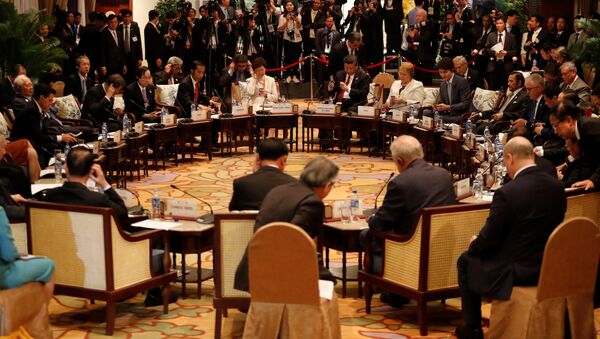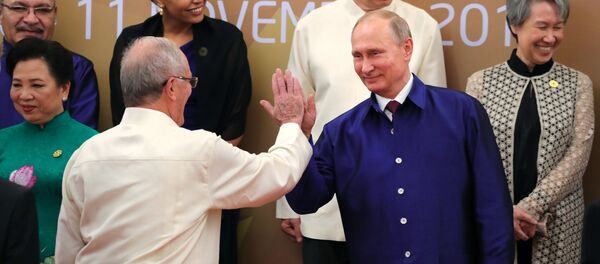It took APEC’s foreign, finance and economic ministers three days to agree on a joint statement following their Wednesday meeting in Da Nang, Vietnam. The document describes collaborative activity, such as the provision of support for small businesses, promoting sustainable growth and deepening economic integration. Apparently, however, views regarding these key issues, especially the last one, vary greatly among APEC’s key members.
READ MORE: APEC Summit Delegates Hope Reaching Deal on TPP May 'Become Impetus for Trump'
Chinese leader Xi Jinping made it clear that his country will further support globalization and free trade, while Donald Trump focused on what he calls “fair trade,” which, according to some observers, will strip America of its economic leadership role and push it down a path towards isolationism.
Xi: “Economic Globalization is Irreversible” as Chinese banks announce shares will be made available to international investors & global institutional fund partners.
— Graham Robert Evans (@cliviagraham) 10 ноября 2017 г.
New economic leader storms onto international stage in role reversal to USA.
Not surprising. Exiting TPP, an isolationist worldview, and alienating trading partners like Canada and Mexico have opened the door for China to expand its influence. No wonder Pres Xi is being so gracious to Trump.
— Rafael Alejandro (@RafaelAlejoDC) 10 ноября 2017 г.
This disaccord between Washington and Beijing didn’t go unnoticed, just like other subtle, but visible changes in US foreign policy under Trump. It seems that the White House is looking towards broadening its foreign policy focus from Asian countries to a wider area, which includes India, so instead of “Asia Pacific” both Trump and his aides are now talking about the “Indo-Pacific.”
"All about 'Indo-Pacific,' the new term Trump is using to refer to Asia" — https://t.co/Uv9iOD75c7
— Craig Rozniecki (@CraigRozniecki) 7 ноября 2017 г.
The gap between Washington’s current agenda and the priorities shared by other APEC members seems to be stretching far beyond just commerce, profits, or geopolitics.
Russia and China, according to their leaders, are focusing on cyberspace and the digital economy. Vladimir Putin mentioned these topics in his APEC article, published right before the summit:
"We believe that establishing effective cooperation to support innovation is the most important task we face in this dynamic era. As such, Russia has put forward a number of specific initiatives. These include unifying digital economy and trade rules, harmonizing national technical standards, coordinating strategies for forming high-tech markets, and creating a uniform conceptual framework for the digital space."
Putin’s Chinese counterpart Xi Jinping also talked about the digital economy in his speech at the APEC CEO summit, although nothing remotely similar to Trump.
Xi: talks about artificial intelligence, quantum science, the digital economy. Trump: no mention of any of that.
— Karishma Vaswani (@BBCKarishma) 10 ноября 2017 г.
Besides the summit’s main agenda, APEC leaders had a series of bilateral meetings on the sidelines.
Nevertheless, Putin and Trump shook hands and talked to each other briefly twice – at the formal gala dinner, and before the summit working session on Saturday.
The two leaders signed an agreement on a peaceful solution in Syria, supporting Syria’s sovereignty, territorial integrity and the country’s fight against Daesh.
Russian & US Presidents agreed that there is no military solution to the conflict in #Syria. They confirmed that the ultimate political solution to the conflict must be forged through the Geneva process pursuant to UNSCR 2254 https://t.co/Ej5brwcf7c pic.twitter.com/121yyyFCk1
— MFA Russia 🇷🇺 (@mfa_russia) 11 ноября 2017 г.
Next year’s APEC summit will be held in Papua New Guinea, with the organization’s long-term strategy being one of the main agenda items. But with key players, such as the US, making a 180-degree turn in trade policies in favor of isolationism, in many aspects the future of the Asia Pacific Economic Cooperation remains unclear.
APEC is a forum of 21 Pacific Rim economies that promotes free trade between members. It was created in 1989, with Russia joining the organization in 1998.



